At a school named GSS Tureta, located in a rural community in Sokoto, Vice Principal in charge of administration, Mallam Balla, and some teachers were seen using students for hard labour on their farms.
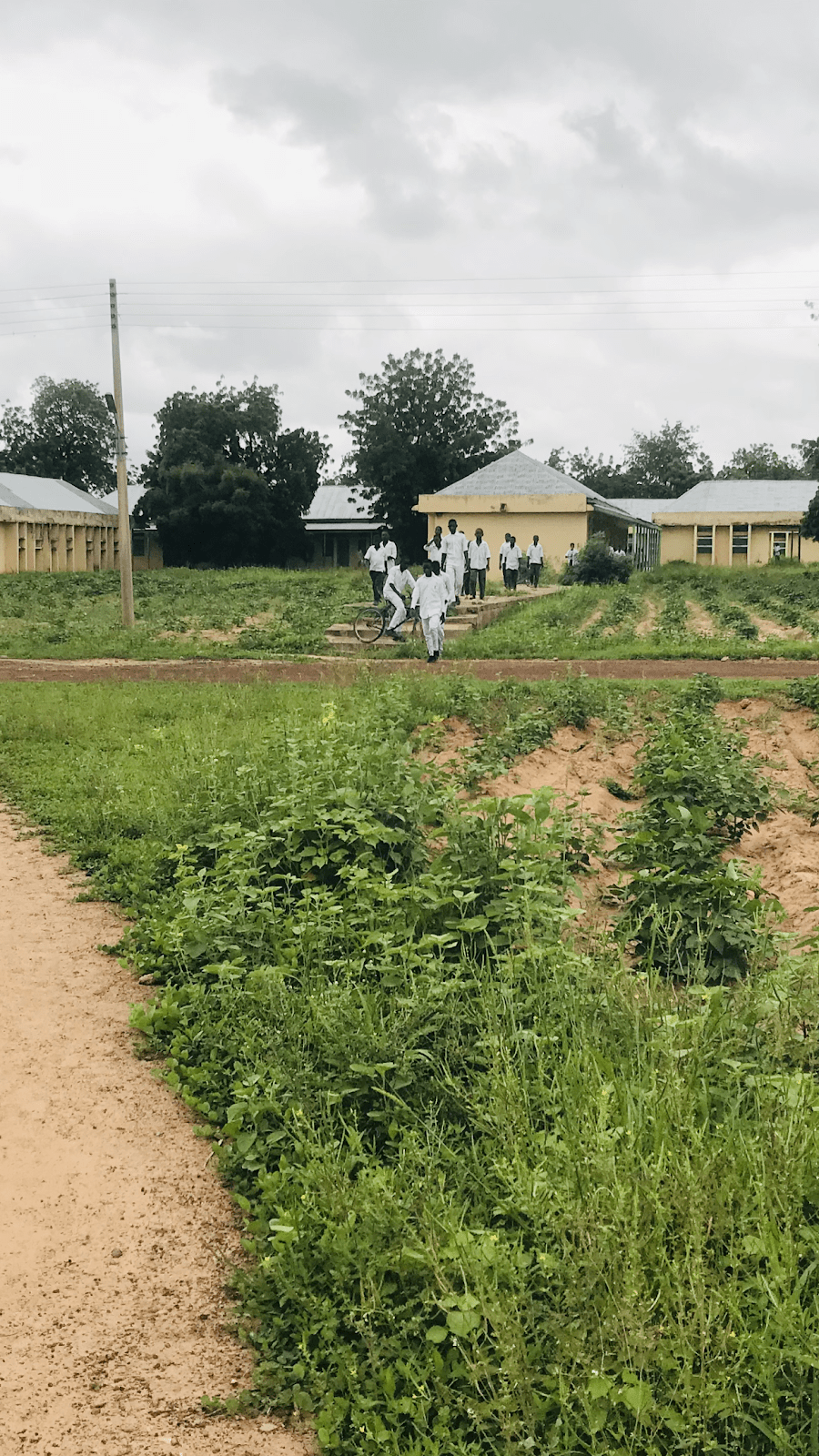
The picture of 38 students coming from Mallam Balla’s Farm, the Vice Principal Admin
During a visit on August 14th at 11:21 AM, the reporter noticed that the class had only a few students present. When inquiring about the reason for this, the students in the class explained that their peers had gone to Vice Principal Mallam Balla’s farm to work. The reporter asked one of the students to guide him to the VP’s farm. On the way, the journalist saw 38 students returning from Mallam Balla’s farm, having completed their daily labour. Students who spoke with the reporter disclosed that they were required to work on their teachers’ farms every day. Failure to meet expectations would result in physical discipline.
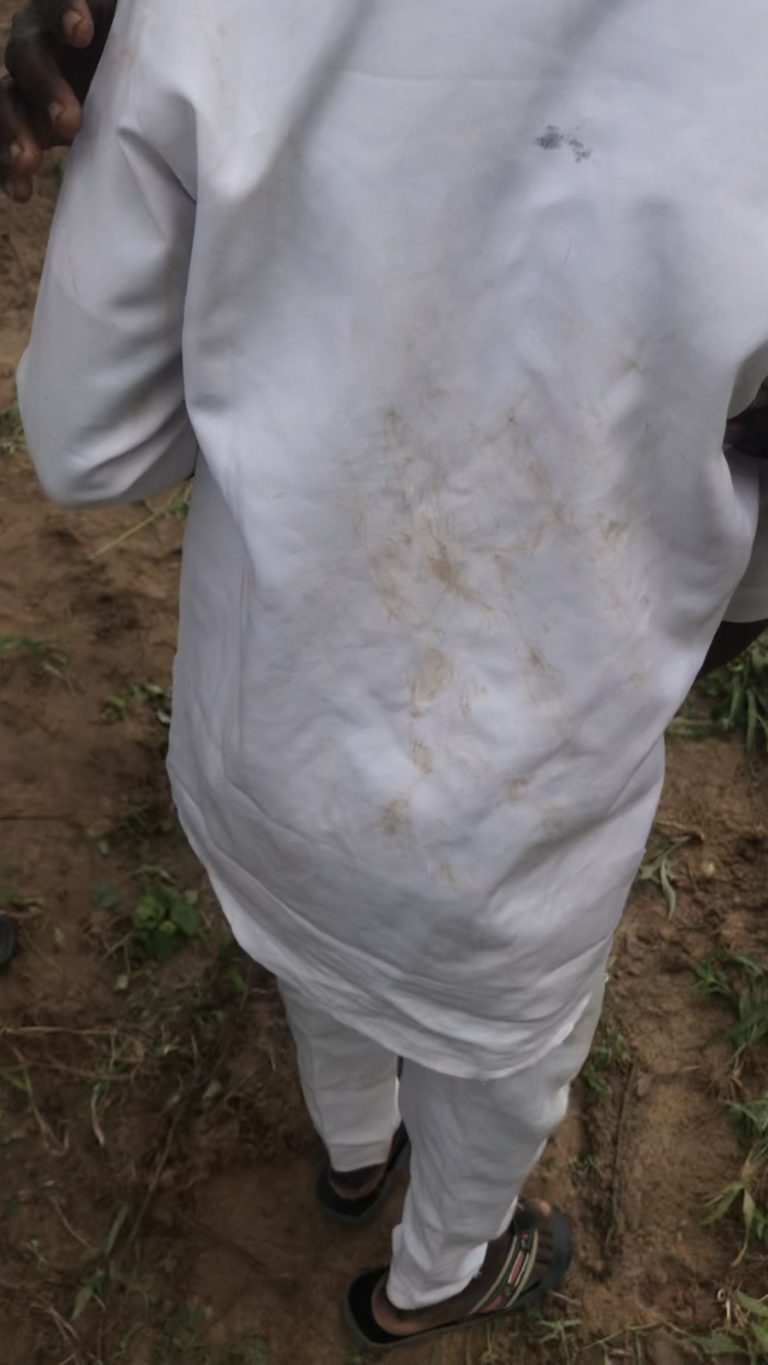
The sign of cane at the back of one of the students because of his refusal to work on the farm
The 38 students were among the 72 million child labourers between the ages of five and 17 in Africa, according to data by the International Labour Organization (ILO).
The National Bureau of Statistics (NBS) 2017 Multiple Indicator Cluster Survey (MICS) said that about 43 percent of Nigerian children between the ages of 5 and 10 were working, and about half of the working children were estimated to be engaged in child labour. Children in Nigeria are engaged in the worst forms of child labour, including working in quarry granite and gravel fields, commercial sexual exploitation, and armed conflict.
Meanwhile, Section 28 of the Child Rights Act of 2003 (a law in Nigeria that was enacted to safeguard the rights of children) stipulates that “no child shall be subjected to any forced or exploitative labour; or employed to work in any capacity except where he is employed by a member of his family on light work of an agricultural, horticultural, or domestic character; or required, in any case, to lift, carry, or move anything so heavy as to be likely to adversely affect his physical, mental, spiritual, moral, or social development; or employed as a domestic help outside his own home or family environment.”

The picture of the farm where the students worked on August 14, 2023
Subsection three (3) of the Act provides punishment of a fine not exceeding N50,000 or imprisonment for a term of five years or both for any person who commits the offence of child labour.
Subsection 4(4) states that “where an offence under this section is committed by a body corporate, any person who, at the time of the commission of the offence, was a proprietor, director, general manager, or other similar officer, servant, or agent of the body corporate shall be deemed to have jointly and severally committed the offence and may be liable on conviction to a fine of two hundred and fifty thousand naira.”
Today in Nigeria, 34 states, including Sokoto, have adopted the Act, with two remaining.
.jpg)
Maccido Lauwali who was just coming to school from home by 11:21 AM
Poor state of school
Around 11:21 AM, Maccido Lauwali, an SS1 student, was returning from home when the reporter saw him. Lauwali highlighted the shortage of teachers, noting that boarding students had been relocated to town. When asked about the empty classroom, he explained that other students were working on Mallam Balla’s farm.

The state of class and furniture of GDSS Tureta school
Ibrahim Bello, an SS1 student overseeing those who worked on the farm, disclosed that they were in the midst of first-term exams and were just returning from the vice principal’s farm. He explained that they worked on the farm daily, and any refusal would result in seniors being directed to administer punishment. While he spoke, two students displayed the marks of cane lashes on their backs.
Bello stated, “We don’t have tools like hoes or cutlasses; we’re uprooting weeds with our bare hands. This causes pain and sometimes injuries to our hands. It’s not just this farm, we also work on other teachers’ farms. Some challenges we face include lack of electricity, non-functionality of laboratory equipment due to a lack of light, and the absence of water. We have to go to town to find water.”
-1707996965.jpg)
The picture of students that worked on the farm and the farm where they worked on
A contract worth N84.656 million was awarded to Nushemaa Precious Minerals Limited for the expansion of GSS Tureta. However, it was not executed. The Vice Principal of the school, Mallam Balla, confirmed that no expansion was executed in 2022, stating that the last renovation occurred in 2020. He noted there were enough classrooms, toilets and furniture, but identified issues of no electricity, water, and outdated library textbooks as key problems. Dilapidated staff quarters had necessitated renovation, and security was required to safeguard school property.
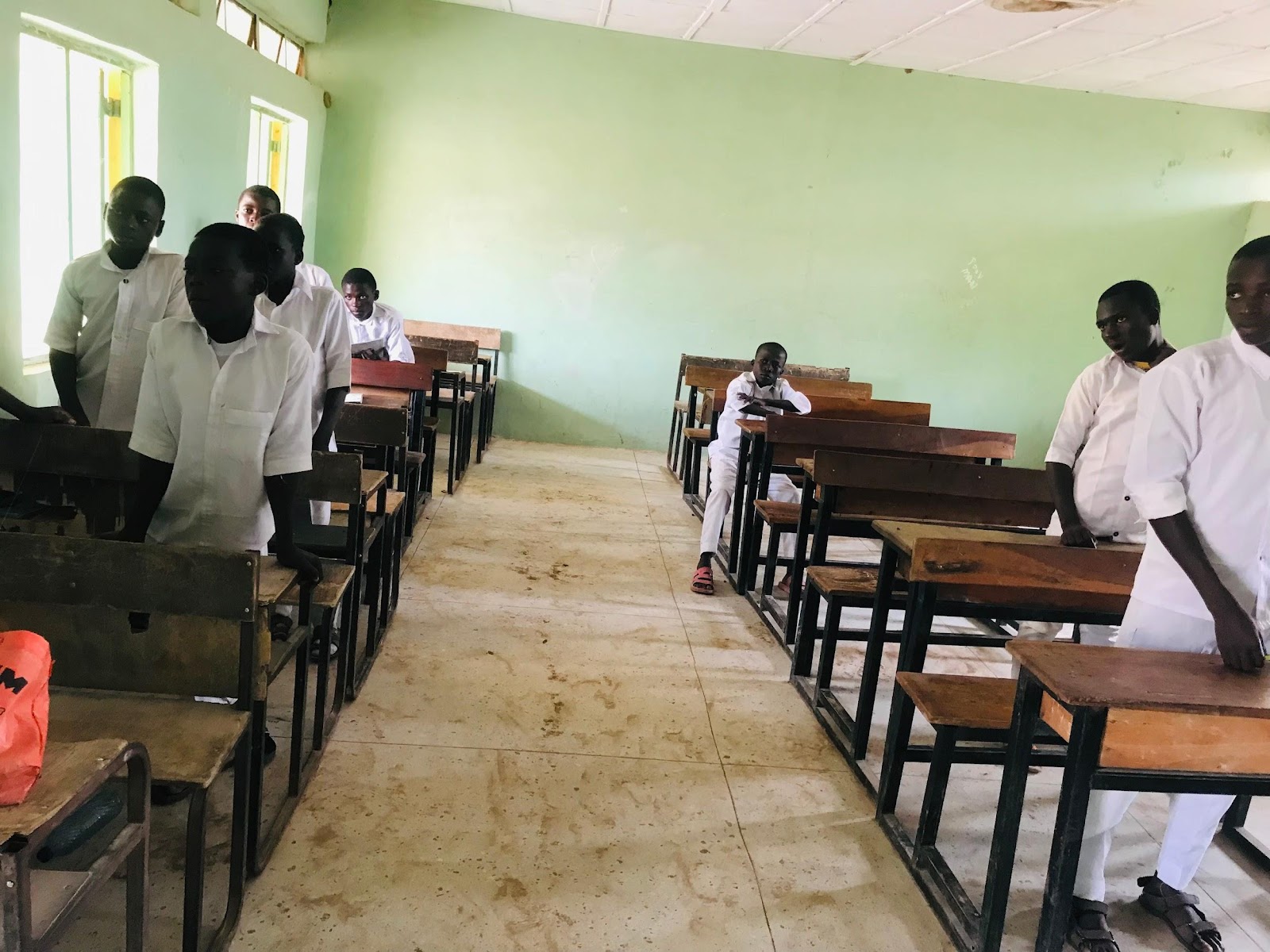

The picture of the scanty classrooms at GDSS Tureta
Balla said, “This school was merged with Sultan Abubakar College in town. In 2020, our students were transferred there following an abduction incident at Kankara School in Katsina State. The Ministry of Education directed the evacuation of boarding schools in Sokoto, Niger, Zamfara, and Katsina due to the student kidnappings at the time.”
On June 26, 2022, Sokoto State also awarded over N84 million worth of contracts (N8465625.00) to Nushemaa Precious Minerals Limited for the expansion of the existing school, GDSS Tureta. The contracts were under the Ministry of Basic and Secondary Education.
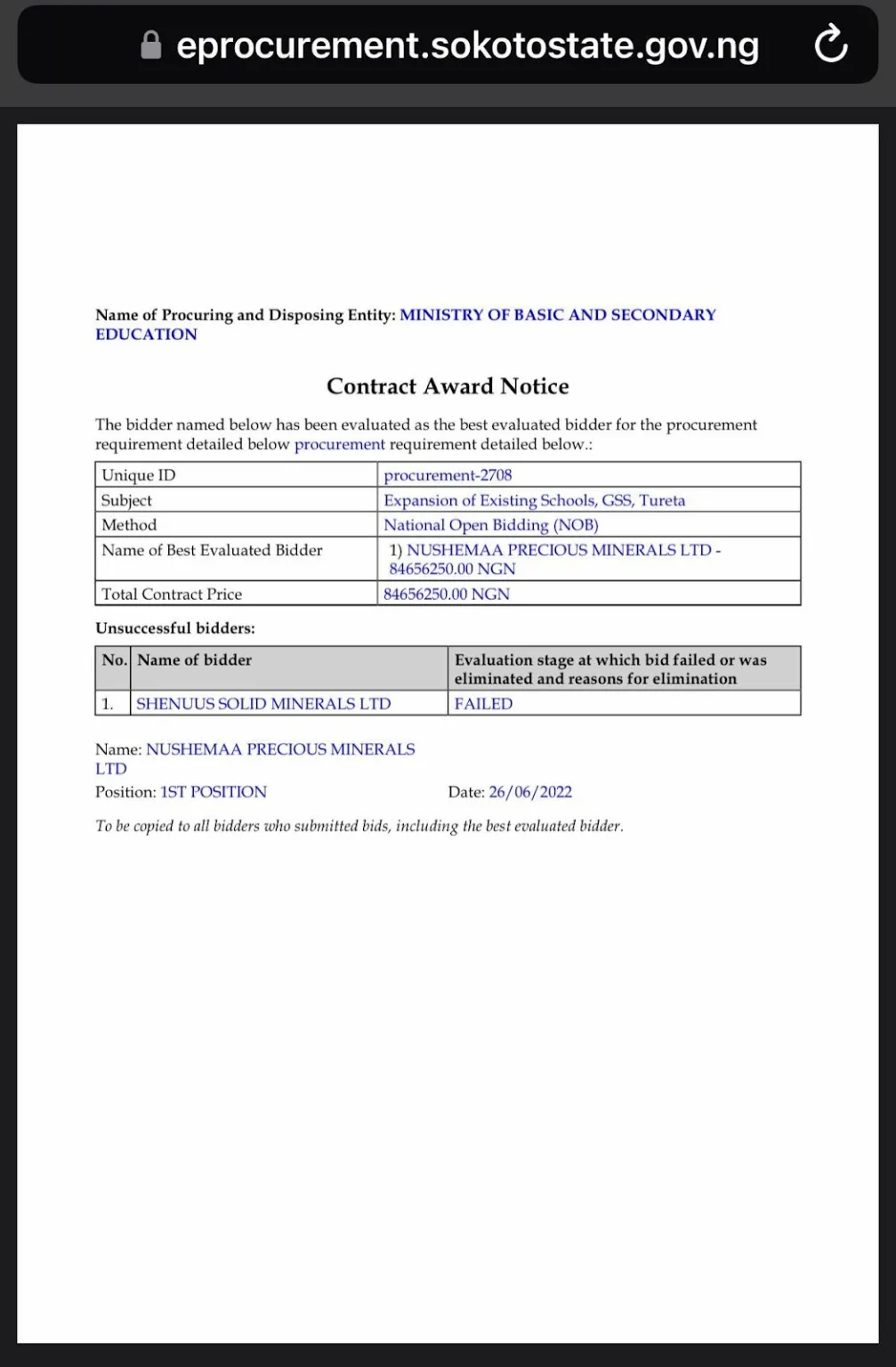
The award notice for the expansion of GSS Tureta
A check through the CAC portal showed that the company was established on December 11, 2018, a day after Sunakhab, and six days after Shenuus Solid Minerals Limited.
Further checks on Nigeria24 and NG. Check.com showed that Nushemaa Precious Minerals is owned by Kabiru Haliru. Many in the ministry believe Kabiru Haliru is the incumbent Sokoto State Solicitor-General and former secretary of the BPP department. However, the solicitor-general denied he owned those companies.
The contract award notice stated that Shenuus Solid Mineral failed at the evaluation stage. The directors of this company are Kabiru Haliru, the director; Kabiru Nusaiba; Kabiru Nusaiba Haliru; Ibrahim Usman and Usman Ibrahim, who are the secretary and the deponent.

The picture of Mallam Balla’s Farm where the students have worked for the day
Suspicious contracts
In this e-procurement portal, many contracts were awarded and distributed among the four companies owned by one Kabiru Haliru. These companies are Sunakhab, Nushemaa Precious Minerals, Shenuus Solid Minerals Limited, and Marbash Farm Limited.


One of the contracts was for the purchase of HP laptop computers and 100 tablets for the school’s head teachers. It was awarded to Sunakhab at the sum of N48.275 million but Shenuus and Mabrash Company failed at the detailed and preliminary stage.
Renovation of the Survey Office, including fencing of the whole complex, was awarded to Sunakhab for the sum of N51.896 million, while Nushemaa and Shenuus failed. Construction of Corpers’ Lodge of the Ministry at Unguwar Rogo Area was awarded to Sunakhab at the sum of N13.108 million. However, the second Phase landscaping and surface dressing of SSTC terminal and fencing of works school was awarded to Marbash Farms Limited at the sum of N99,68098).


Rehabilitation of Works School was awarded to Nushemaa at the sum of N65,0175 million. Renovation of Primary Health Care Kofar Rini was awarded at the sum of N52.392 million to Shenuus, whereas construction of drainages at Tsafe Road was contracted to Nushemaa at the sum of N105.165 million. The purchase of 4NOS workshop equipment for the mechanical section (EG drilling machine, milling machine, power hacksaw, and welding machine) was awarded to Shenuus Solid Minerals LTD at the sum of N138.675 million.



What the law says
The involvement of any BPE official in the activities leading up to the award of projects to the four companies is in contravention of Section 26, Sub-section 24, and punishable by Section 70(5) of the Sokoto State Bureau for Public Procurement and Price Intelligence Law, 2012.
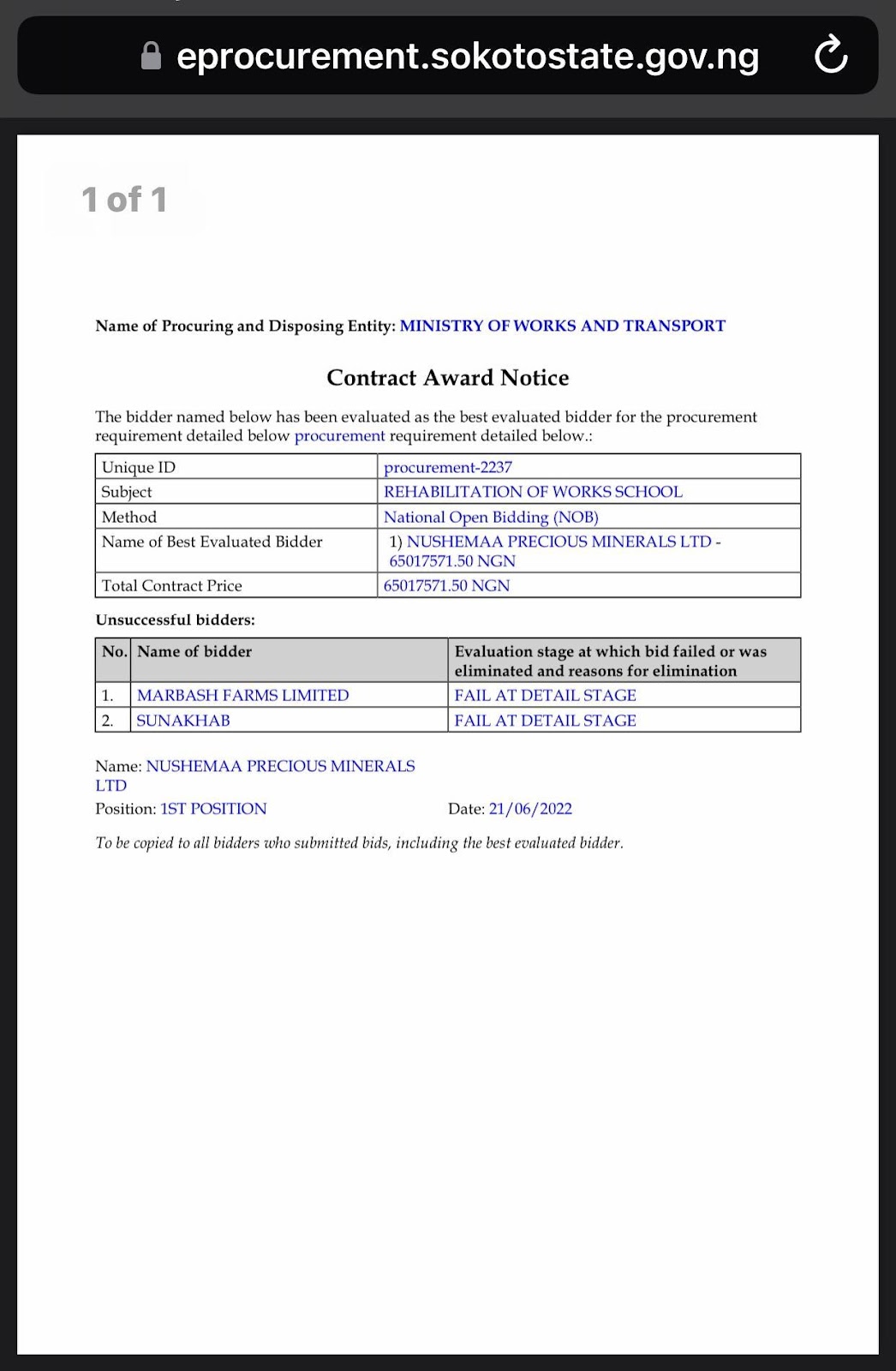
Section 26 states that:
“Any person who has been engaged in preparing for a procurement or part of the proceeding thereof may not bid for the procurement in question or any part of it either as main contractor or sub-contractor and may not cooperate in any manner with bidders in the course of preparing their tender.”
The latter states that:
“Any person who will be carrying out his duties as an officer of the Board or any procuring entity who contravenes any provision of this Law commits an offence and is liable on conviction to a cumulative punishment of: (a) a term of imprisonment of not more than 2 years or ₦200,000.00 fine
(b) termination of appointment from government service.”

Legal expert condemns procurement misconduct, child labour by teachers
Lukman Raji, a lawyer at Lukman Raji & Co. (Onikepe Chamber) and legal counsel for the Elites Network for Sustainable Development (ENETSUD), a non-governmental organisation (NGO) and anti-corruption group based in Kwara State, has condemned the suspicious contract awards by the Sokoto BPE, noting that there were serious procurement process violations. These actions, he asserted, ran contrary to the Public Procurement Act of 2007 and the Public Procurement Law of Sokoto State, both of which were designed to prevent undue advantages for any procurement officer.
Raji emphasised that such behaviour constituted a flagrant abuse of the law and was strictly prohibited.
“If it can be proven that the secretary of BPP has a connection to the companies, then it constitutes a criminal offence punishable by imprisonment or fines,” Raji warned.
“The procurement process is supposed to undergo three or four stages before contract awards. It should be as transparent as a ballot. The procurement body establishes its figures and targets, inviting experts to submit bids that come close to their estimations,” Raji explained.
“Unfortunately, many of these processes are tainted by corruption, with insiders approaching outsiders to manipulate their bids. Honesty and transparency are essential to ensuring things proceed as intended.”
Raji believed that public officers should refrain from engaging in “gift syndrome” or accepting bribes, as this would compromise their integrity. He advocated disclosing any personal acquaintance between public officers and contract applicants to facilitate proper monitoring.
“In law, there’s a principle that you cannot judge your own case. If someone has a close relationship with the person awarding a contract, they should not oversee procurement processes. Public officials should minimise unnecessary social interactions, as these can lead to corruption. Favouritism due to personal relationships is corruption,” Raji said.
Regarding teachers employing students for personal tasks such as farm work, Raji deemed such practice as unlawful and a violation of civil service rules that could result in a teacher’s dismissal.
“During school hours, students should be in class receiving lectures. Using them for private business ventures is an offence reportable to the Ministry of Education. These actions must cease, as they lack legal and ethical support,” he stated.
Raji concluded that reporting cases of child labour by teachers was crucial, as students might not be able to voice their grievances or distinguish right from wrong.
“The solution lies in filing complaints with the Vice Principal or relevant authorities within the Ministry of Education to address these instances of child labour, which are illegal,” he added.
Former acting DG of BPP reacts
In an interview, current Solicitor-General of the Sokoto State Ministry of Justice and former Secretary of the Bureau of Public Procurement, Kabiru Haliru, a lawyer, said all the contracts uploaded on the e-procurement portal of Sokoto State were not contracts, but they were uploaded to validate and test the e-procurement portal.
He asked the reporter to go to the concerned ministry and ask about the contracts. He noted that the ministry would tell the reporter whether the contracts were not awarded or simply meant to validate the e-procurement portal.
When he was confronted with the fact that most of the contracts were awarded to his companies and the companies of his brothers, he denied, insisting that they were not his companies. The reporter also asked why the contracts were awarded at the time he was the acting DG of BPP after the former DG had resigned from office. He replied that the former DG was still in office at the time the details of the contracts were uploaded.
However, when the reporter mentioned the names of directors in Nushemaa Solid Minerals, where Kabiru Haliru also appeared as a director, he hung up immediately, and refused to pick up his calls.

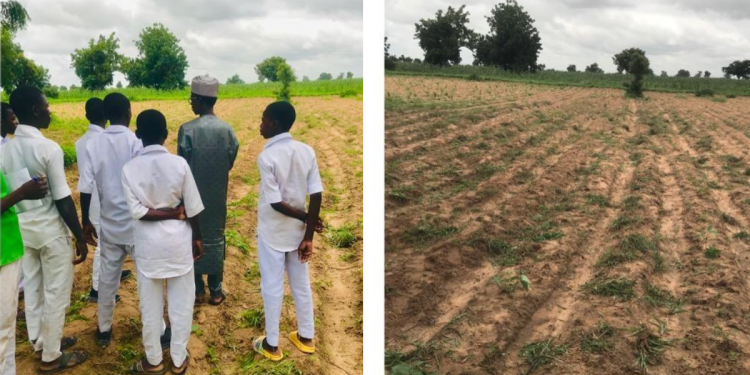




.jpg)

-1707996965.jpg)












